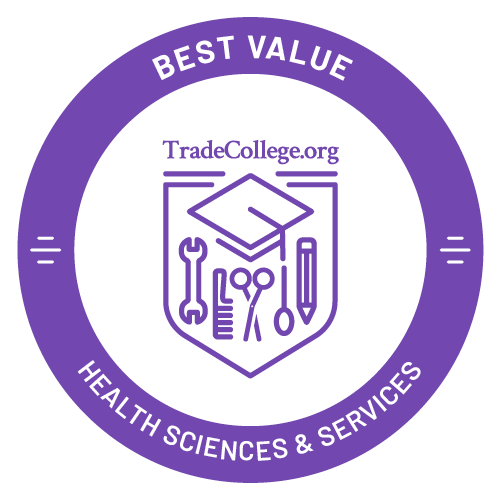Find Trade Colleges
2023 Best Value Health Sciences & Services Bachelor's Degree Schools in Vermont
Highlighting Quality Schools With More Affordable Pricing
Finding the Best Health Sciences & Services Bachelor's Degree School for You
In 2021-2022, health sciences & services students earned 100 degrees and certificates from a Vermont school, making the subject the 2nd in the state.
There are so many trade school programs in today's world that it can tough to figure out which one is the right one for you. Along with traditional schools that require in-person attendence, you can attend one of many reputable online schools. Some programs even offer a hybrid experience.
To assist you in seeing some of the education options that are available to you, Trade College Search has created its Best Value Health Sciences & Services Bachelor's Degree Schools in Vermont ranking. This report analyzed 2 schools in Vermont to see which ones offered the best value bachelor's degree programs for health science students. The goal was to highlight schools with more affordable prices than others offering similar quality experiences.
This ranking is not just a list of inexpensive schools. We also consider each school's quality, since we believe a low-quality school may not be a 'bargain' at any price. Specifically, our score for quality is discounted by the published tuition and fees charged by the given college. This gives the cost per unit of quality for each college. The more quality your dollar buys, the better the value.
For nationwide and regional rankings, we use out-of-state tuition and fees in our calculations. For statewide rankings, we use average in-state tuition and fees.
Featured schools near , edit
2023 Best Value Health Sciences & Services Bachelor’s Degree Schools in Vermont
Check out the health science bachelor's degree programs at these schools if you want to get the best value for your educational dollar.
Best Vermont Schools for Affordable Quality for a Bachelor's in Health Sciences & Services
Our analysis found Castleton University to be the best value school for health sciences & services students who want to pursue a bachelor’s degree in Vermont. Castleton is a small public school located in the town of Castleton.
Castleton undergraduate students pay an average of $13,078 in in-state tuition and fees each year.
In addition to its best value ranking, and one of the reasons why the school is on the list, Castleton is ranked #4 for overall quality for health science in Vermont.
Read full report on Health Sciences & Services at Castleton University
Out of the 2 schools in Vermont that were part of this year’s ranking, University of Vermont landed the # 2 spot on the list. UVM is a large public school located in the small city of Burlington.
UVM undergraduate students pay an average of $18,890 in in-state tuition and fees each year. On average, health science graduates from UVM take out $21,105 in student loans while working on their Bachelor's Degree.
UVM did well in our overall quality rankings, too. It placed #2 on our Best Health Sciences & Services Bachelor’s Degree Trade Schools in Vermont list.
Full Health Sciences & Services at University of Vermont Report
Best Value Health Sciences & Services Colleges in the New England Region
Explore all the Best Value Health Sciences & Services Schools in the New England Area or other specific states within that region.
| State | Degrees Awarded |
|---|---|
| Massachusetts | 708 |
| Maine | 241 |
| Connecticut | 212 |
| Rhode Island | 233 |
| New Hampshire | 423 |
Health Sciences & Services Related Majors for Health Science
One of 11 majors within the trade school area of study, health sciences & services has other similar majors worth exploring.
Health Science Focus Areas
| Major | Annual Graduates |
|---|---|
| General Health Services/Allied Health/Health Sciences | 30,811 |
| General Health & Wellness | 5,951 |
Most Popular Related Majors
| Related Major | Annual Graduates |
|---|---|
| Health & Medical Administrative Services | 88,600 |
| Practical Nursing & Nursing Assistants | 85,339 |
| Allied Health Professions | 83,905 |
| Allied Health & Medical Assisting Services | 83,587 |
| Mental & Social Health Services | 30,331 |
Notes and References
*These averages are for the top 2 schools only.
- The Integrated Postsecondary Education Data System (IPEDS) from the National Center for Education Statistics (NCES), a branch of the U.S. Department of Education (DOE) serves as the core of the rest of our data about colleges.
- Some other college data, including much of the graduate earnings data, comes from the U.S. Department of Education’s (College Scorecard).
- Credit for the banner image above goes to Sandra M. Palumbo.
More about our data sources and methodologies.



